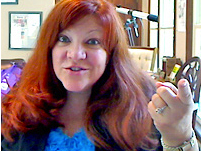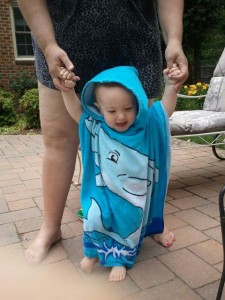Learn like Luke Skywalker
Sheryl Nussbaum-Beach was recently cited by a popular website as a Top 50 “Eduprenuer” for “paradigm-shifting professional development.” Through her company Powerful Learning Practice, she and co-founder Will Richardson have prepared and inspired thousands of K12 educators to “make the shift” to 21st century teaching and learning — on behalf of their iGeneration students — by becoming connected educators themselves.
A 25-year educator, Sheryl has been a classroom teacher, technology coach, charter school principal, district administrator, university instructor, and digital learning consultant. She’s a leading advocate for virtual communities of practice as essential components of professional learning in a connected world and the lead author of the Amazon bestseller The Connected Educator: Learning and Leading in a Digital Age.

by Sheryl Nussbaum-Beach
I am helping to lead an online community of practice initiative in Alberta, Canada. In reading a thread in the community this morning I noticed one of the participants responding to a video someone shared. Here is what she said:
Why does it always get back to what we learned when we were in Kindergarten? Once again I’m reminded of the simple truth that so much that it is important just has to do with seeing someone as just another person like me and then treating them as I want to be treated. So simple and yet hard to do.
Going back to what we learned in kindergarten struck a cord with me. It represents a time when, as learners, we were hungry to know. We still had a sense of wonderment and learned mostly from self driven experiences. Kindergarten educators are typically still willing or free to nurture that sort of curiosity and passion. If we are early-childhood teachers, we let children explore and take control of their own learning. We are willing to situate them in immersive environments that encourage discovery and learning, standing back and watching as they make sense of their environment and the world in which they live.
But for some reason when kids get older, we shift that scenario. Play and exploration are cast aside as not important or controlled enough to result in deep learning. Education becomes something more simulation based, something we develop and deliver. As children progress (is that the right word?) through the grades, learning becomes filtered through teacher and master lenses.
Rather than provide a rich learning environment and then stand back as the young scientist makes sense of their world, we predetermine what it is we feel they should learn and know. We mold, shape and impose rather than letting learners pick and choose what they want to explore and dabble in. We convince ourselves that direct instruction produces better learning. We agree that adults who simply serve as helpers, facilitating a child’s chosen learning journey, are just too laissez-faire. We are certain that we as teachers know what is best for learners and that education happens only when a teacher-student relationship exists. They are kids. They can’t be trusted to know what they need or should learn at this immature stage. Right?
Why do we do that?
Maybe some of the reasons for our need to control learning so tightly are embedded in the fact many of us are educating the masses. When you educate 20, 25, 30, 40 kids at a time, you have to standardize to make certain that things are effective, efficient and flow smoothly. There’s no time to deviate, to explore down roads less traveled, to follow up on interests that one child might have, because everyone is on the same train heading in the same direction and expected to get to a certain destination at the same time.
Imagine what would happen if 40 kids showed up for your biology class and you gave them all bicycles and a bucket and shovel, and let them take off in different directions, rather than everyone getting on your carefully scheduled and organized train. Chaos, right? I mean seriously: how would you control the learning if they were all on their own path? It would be impossible to cover all the content and have them all test well. And therein lies the problem.
What if we restructured a bit?
Just think how deep the learning would be if it was driven by “want to” rather than “have to” motivation. By rocket fuel, not lighter fluid. What if we developed environments that were created intentionally so that they fostered a passion to learn? What if our primary role as teachers was to be a catalyst for learning — always on-hand, answering questions, pointing out exciting things along the way? What if the child’s passion and interest in the materials, the manipulatives, the media and books we provided — what if that directed the learning journey?
What if education wasn’t about efficiency and control, standardization and economies of scale, but was instead about each child’s personal learning journey, steered by the headwinds of wonderment? What if your role was to be a learning travel agent, arranging journeys that ensured each child immersed in your learning trips would not only learn (often very different things) but have a great time doing it? What if their learning was always full of authentic purpose, aligned with personal passion for the topic?
Think about the “Choose your own adventure” books many of us loved as kids. What if your role was to design learning like that? What if — instead of teaching them, you helped them to be fully engaged learners? What if instruction wasn’t content focused but environment focused, heading off in surprising directions determined by a learner’s interest and choice of content along the way?
Take, for example, my grandson
My grandson is really into walking. Luke Skywalker Walblay (right) turns one next week. And he is REALLY into walking. He has taken lots of first steps on his own for short amounts of time, and we all cheer and he likes it – some. But what he really likes is holding your finger and traveling long distances around the house, yard and driveway. It is his passion, not mine (it is uncomfortable for me to lean over like that for long periods of time).
Because of his intense interest in walking fast and far, he is motivated to do it for long periods of time. When I care for him I have a choice: I can spend my day distracting him so I can do what I want (read books, play on the carpet, swim in the pool), or I can leverage his interest as a means to help him learn new things. I have chosen the latter.
When Luke comes to visit, we walk together everywhere (he is very happy), and I use the opportunity to constantly label, vocalize, and encourage him to repeat sounds and words. I stop on our walking circuit in the backyard to look up in the tree and say “bird,” or on our track in the house where we stop here and there to say: “television” or “cabinet” or “dog.” Luke is moving and mastering his passion while being exposed to lots of learning on the journey. It works. I am respecting him as a learner who has his own desires and interests, but as long as he is interested, I am also sharing what I know with him along the way.
Hungry to learn
Learning is personal knowledge construction, fueled socially as we schematically connect ideas and concepts — as we do things and discuss them with others. Just like we shouldn’t eat until we are hungry, I believe learning should be natural and likewise fueled on demand.
Give children a rich, interesting environment or scenario filled with beautiful literature, authentic problems to solve, and places to explore or create a journey, and you will have kids who are motivated to learn and engage. A steady diet of force-fed content with no authentic and ongoing opportunities for application goes against the natural way we are designed to learn.
The way we learned in kindergarten.
































Your Luke Skywalker article was right on. Of course it’s very hard to implement in a classroom, however it worked beautifully in my homeschool when I was raising my own children. It was a joy to be the guide/teacher, and to watch as each child explored and learned in my home classroom which I made sure was rich in educational materials and manipulatives. Both students graduated from college summa cum laude, and one is now a Harvard Law School graduate and teaching law at Georgetown Law School in DC! My daughter is now teaching her own children in the same way.